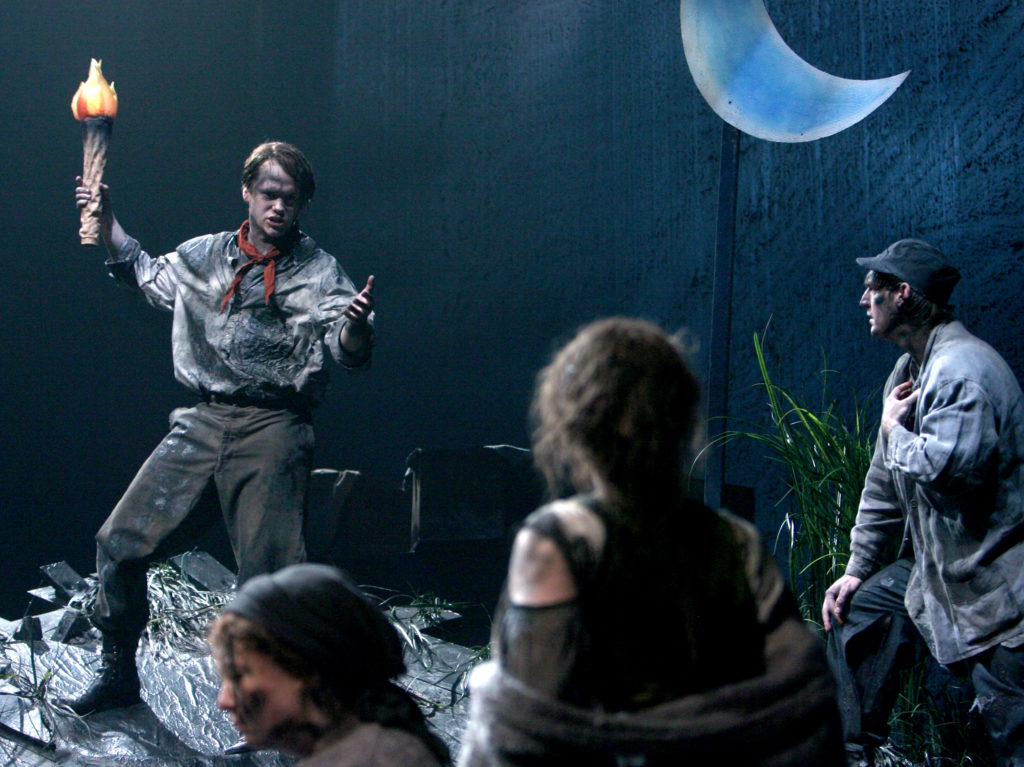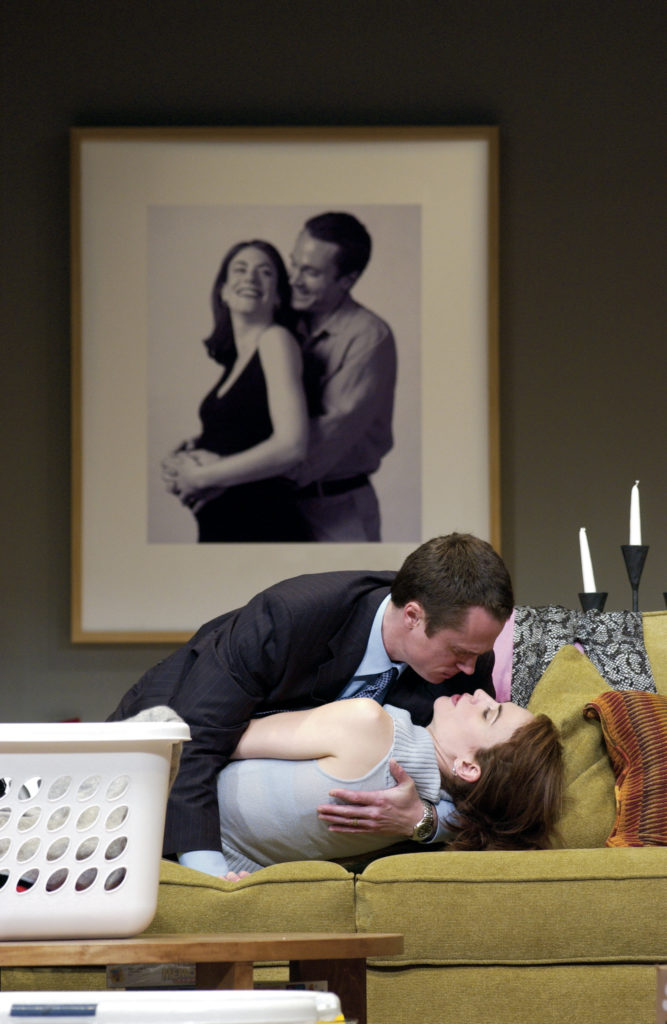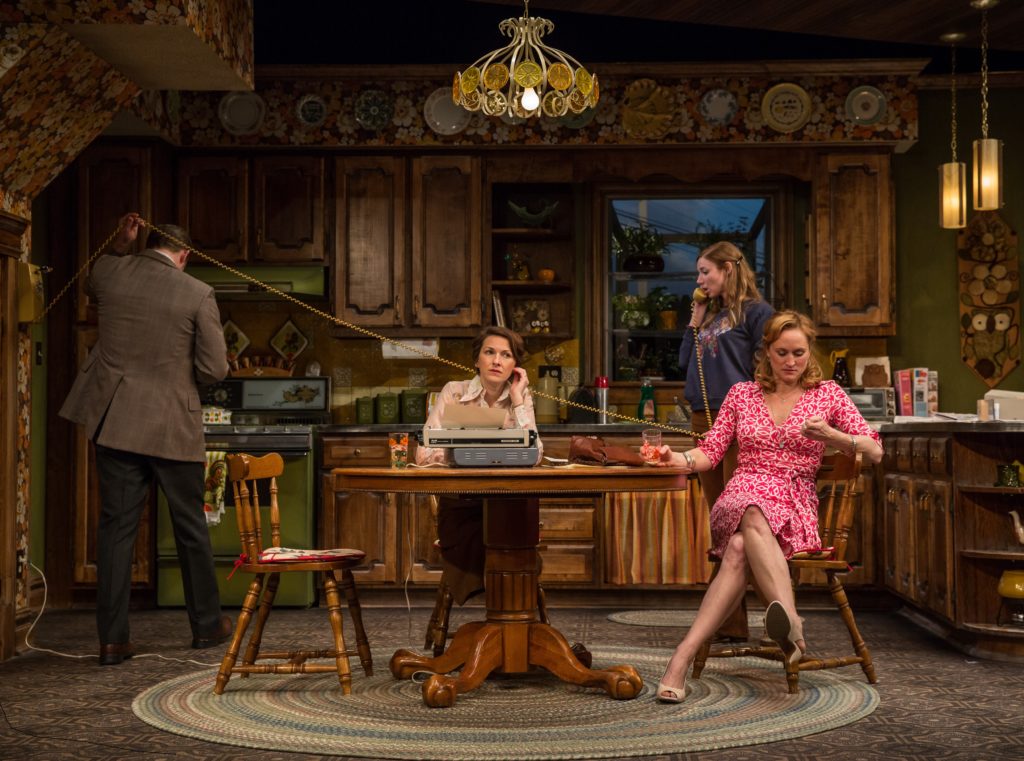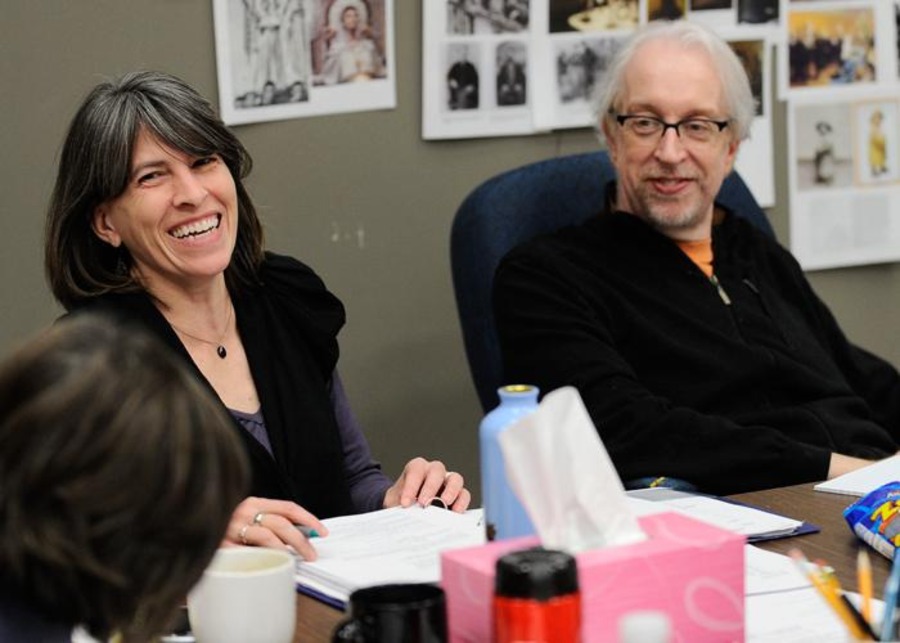After 25 years of working together, Robert Falls and Rebecca Gilman have developed a shorthand style of communication that transcends the traditional director-playwright relationship. And now they’re about to embark on their latest collaboration, just as Falls makes his exit as artistic director of Chicago’s Goodman Theatre, a post he’s held since 1986.
“Rebecca is my real soulmate,” said Falls. “We fight about things similarly, like how we both view the theatre, how actors should tell stories, and the subject matter.” Fights aside, he said, “We respect each other, knowing we are working toward a common goal.”
The two first crossed paths when Gilman received the Scott McPherson Award from the Goodman Theatre in 1999, commissioning her to write Spinning Into Butter, which went on to become the third most-produced play in the U.S. 2000-01 season. They have since worked on six productions together, all of them of plays about American life, often with a political edge. Their newest project puts politics right in the title: Swing State runs at the Goodman’s Owen Theatre Oct. 7-Nov. 13.
Swing State is set in Wisconsin, where Gilman currently resides, during the COVID-19 pandemic, as a recently widowed retired school counselor finds herself caught in the middle of feuds among neighbors over the actions of an out-of-state power company. Swing State offers a contemporary portrait of America’s heartland at a time when many folks feel their way of life is in danger of disappearing, and everyone seems to have a different idea of what it means to be an American.
“Wisconsin is so wonderful and problematic,” Gilman said. “I think I’m trying to convey what it’s like to live in a place you love that you feel is heading in the wrong direction.”
“The play also deals with grief and loss for a way of life that is political,” Falls elaborated. “Are we losing our democracy? Are we permanently divided? Can we heal? I think it’s a play of the moment. The four characters represent the current landscape of a political divide going on in our country today.”
Falls was introduced to Gilman’s work by Susan V. Booth, then in charge of new-play development at the Goodman (and now Falls’s successor as artistic director), who urged him to read her The Glory of Living, a bleak drama about a couple who lure young women into a den of abuse and murder.
“I was gripped and terrified,” said Falls of the play. “I was struck and shocked by the play’s boldness and the quality of this voice, which had a sparseness to it. Yet the language and dialogue were so authentic. I just felt this was a unique and fantastic writer, and I wanted to meet her.”
The Glory of Living had a short run at Chicago’s Circle Theatre in 1998, and was a Pulitzer Prize finalist in 2002. Around the same time, Falls was directing Death of a Salesman at the Goodman, which went on win Tonys on Broadway. When 1999’s Spinning Into Butter was staged at the Goodman, with Les Waters as director, Gilman was put at ease when she learned that Falls “heard my play the way I heard it in my head.”
A torn-from-the-headlines play about racism in academia, Spinning Into Butter went on to Lincoln Center in 2000. But when Gilman and Falls met to discuss next steps, she told him she was planning to go back to being a temp worker.
“I don’t think it’s a secret that playwrights don’t make much money,” Gilman said. Although her play had been was successful, it only filled an auditorium of 350 people each night, she reasoned. But Gilman didn’t have to go back to temping, because the Goodman commissioned her to write another play.
“I was thrilled and grateful,” Gilman said. “It made me feel like I had a director who believed in me, and the Goodman could be my home theatre.”

Her next play was Boy Gets Girl, a disturbing thriller about a blind date gone bad that examines the line between infatuation and obsession. It had a successful run at Goodman and made Time’s list of the best plays of the decade.
By this time, Falls said, he was in awe of Gilman’s work. “Boy Gets Girl was one of three plays in my career about which I said, ‘We have to do this.’” In fact, he wasn’t able to direct the play because he was working on another production. They would be reunited for her next Goodman production, but not before a few false starts. Gilman initially wrote the draft of a play about Little Women author Louise May Alcott (“It was terrible,” she said of that abortive effort). And another played called The Great Baseball Strike of 1944 was announced, then scrapped.
Replacing it was a gritty drama called Blue Surge, about the relationship between cops and sex workers, inspired by a passage in John Bowe’s book Gig: Americans Talk About Their Jobs. Falls was on board as director; the play premiered at the Goodman in 2001.
While Falls may be best known for his towering productions of plays by Eugene O’Neill or Arthur Miller, he also developed a reputation for giving world-premiere writers like Eric Bogosian or Steve Tesich the same attention.

“When Bob took over as artistic director at the Goodman, he promised to produce classic plays as though they were new and new plays as though they were classics,” said Gilman. “As a result, I got the same respect as Shakespeare and Chekhov.”
Respect doesn’t mean there aren’t occasional disagreements.
“Bob will say something is unclear, and I will insist that it is,” Gilman said. “We will go into a private room and he will wait for me patiently to overcome my stubbornness until I agree to write a few more lines. Then the actors will agree that the text is much clearer.” After all these years, she joked, “My stubbornness has gone from 20 minutes to two minutes. The digging in of my heels is shorter because I trust Bob.”
To explain their affinity, Gilman points to her and Falls’s shared backgrounds: They both grew up in small towns, and neither came from an artistic family but discovered theatre by reading plays in the public library.
“Even if we had never worked together,” Gilman said, “I know we would have been friends. Now I feel like we’re growing old together and have the same take on life and how theatre plays a role in our lives.”
After Blue Surge, Falls suggested to Gilman that she write a contemporary version of Henrik Ibsen’s A Doll’s House. Falls maintained that she and Ibsen had similar writing styles, and thought, “Rebecca was able to convey a moral perspective on his work.”
Gilman’s Dollhouse, a contemporary update on the classic drama, entwined with dark comedy and social satire set in the Lincoln Park neighborhood of Chicago, premiered at the Goodman in 2005. Their next collaboration was A True History of the Johnstown Flood, inspired by the devastation of Hurricane Katrina.
Gilman’s next commission wasn’t from the Goodman, but as she worked on the play that would result, Luna Gale, a gripping, intricate drama about child welfare and addiction, she said she felt Falls’s presence. “Although Bob had nothing to do with the process, he ultimately informed my decisions on how I wrote the play from beginning to end,” she said.

That turned out to be prophetic when the commissioning theatre decided not to produce Luna Gale, and Falls stepped in as director of the show’s 2014 Goodman premiere. The play went on to earn the 2014 Jeff Award for New Work, the 2015 Steinberg/American Theatre Critics Association New Play Award, and the 2016 LA Drama Critics Award.
The dynamism of the Gillman-Falls partnership doesn’t only apply to premieres. After Gilman’s Soups, Stews, and Casseroles: 1976, a thought-provoking tale about the corporate takeover of a small-town cheese company in Wisconsin, was commissioned and performed at the Repertory Theater in St. Louis in 2014, Gilman and Falls joined for a revival at the Goodman in 2016.
The process of collaborating on Swing State during the pandemic made everything different, Falls noted. “With Swing State, we jumped off the cliff together into the unknown, and have just been together with the play in a different way.”

Falls will be together with his home theatre in a different way soon, though he’s not folding up his director’s chair for good: He will direct Chekhov’s Cherry Orchard there in the spring.
“While it’s my last collaboration as artistic director with Rebecca,” said Falls, “I hope there will be many more collaborations as director and playwright in the future.”
Jill Grant (she/her) is a Chicago-based freelance writer who has covered theatre, dance, and film for the Pioneer Press, Chicago, and the Columbia Daily Spectator, NY, and more. She is a graduate of Barnard College, Columbia University, and has worked at two large PR agencies.


